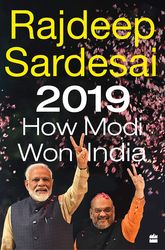The hyperbole begins with the title. Narendra Modi did not "win India". He merely won a Lok Sabha election. That too in terms of seats alone, based on a "first-past-the-post" system. Nearly 63 per cent of those who cast their vote did not vote for Modi or hindutva. How then can the claim be made that he won the nation?
Indeed, in most Lok Sabha elections till the Naughty Nineties, the winner had more seats (in a smaller house) than Modi secured, and a larger vote share. As against Modi’s 303 seats and 37 per cent vote share in 2019, the "winner-take-all" in 1984 was Rajiv Gandhi with 414 seats and a vote share of 48 per cent. Next was Indira Gandhi in 1971 with 362 seats and a vote share of 43.68 per cent. Indeed, in every Lok Sabha election from 1952 to 1984 (except 1967), including Morarji Desai’s victory in 1977, the winner took more seats and a higher vote share than Modi in 2019. Also, don't forget, several seats and some of the incremental share of the votes of the NDA, were on account of BJP allies. So what is so special about Modi’s win?
For Modi to "win India", he would have to change the Indian mindset that for the better part of a century has resisted the siren call of hindutva in a country that is 80 per cent Hindu. Has Modi achieved that? No. In 2019, he and his companions-in-arms, did indeed increase the BJP’s seat-and-vote share at the margin, but with such a heavy concentration of gains in the Ganga basin, that the overall figures mask the much smaller numbers and percentage of Hindus voting for hindutva and its cheer leaders in the rest of India.
Moreover, in terms of state governments under the Narendra Modi-Amit Shah thumb, several journals have run maps showing how, under Modi-Shah's watch, hindutva’s appeal has sharply shrunk over the last two years across a vast swathe of our land. Even if the Central government is baring its hindutva teeth, the people of India are still secular in the main, of which Shaheen Bagh has become the symbol. Unless and until Modi and Shah are able to achieve the transmogrification of the India that has discovered itself over five millennia as a syncretic, secular civilisation, they might, by hook and by crook, win some elections. They will not and cannot “win India” except by changing the trajectory of our civilisational evolution.
Moreover, the only Indian leader to have survived more than two elections with an increased vote share and an increased number of seats was Jawaharlal Nehru, the inventor of the evocative phrase, "The Idea of India". His vision of India was so largely shared by almost all his political opponents that only he could have been said to have "won India". So much so, that it was Nehru speaking in A.B. Vajpayee’s mouth when he publicly reprimanded Modi in March 2002 for betraying his "Raj Dharma".
Rajdeep Sardesai is a chronicler—perhaps the best we have in Indian journalism—but he neither aspires to be, nor is, a political philosopher. Unsurprisingly, therefore, his latest offering on Modi vaulting the pole is a breathless saga of the surface story of events, not a delving into the more pertinent question of whether five (now going on six) years of Modi raj have irreversibly set our nation’s mind on the path devised by Modi’s mentor, V.D. Savarkar, 97 years ago or whether the alternative 'Idea of India' that rendered Savarkar and the RSS incidental to the mainstream of our freedom movement and the first six and a half decades of nation-building, has stolen a march over the original.
Frankly, it is not enough to discover, as Sardesai does, what were the "13 Ms, 2 Ws and a GK" that account for Modi’s "success". I will not even attempt to preempt the reader by decoding this alphabet soup, but will add that Sardesai has left out the 3 Ds—deceit, deception and distortion—and the three Is—invective, innuendo and incitement—that you can find evidence of on pages 146-147. The key issue is whether India has lost forever its civilisational anchor in multifaith pluralism. Six months into Modi 2.0, it seems from the mindless rush in which he is implementing his hindtuva agenda that Modi believes, with Sardesai, that he has won India; which also explains why the BJP is so taken aback by the blowback (brilliantly documented on TV in the last week or so by Sardesai). Not till the events chronicler Sardesai matches last week’s TV anchor Sardesai will Rajdeep emerge as India’s Theodore White (The Making of the President series).
2019: HOW MODI WON INDIA
Author: Rajdeep Sardesai
Publisher: HarperCollins India
Price: Rs699; pages: 392


